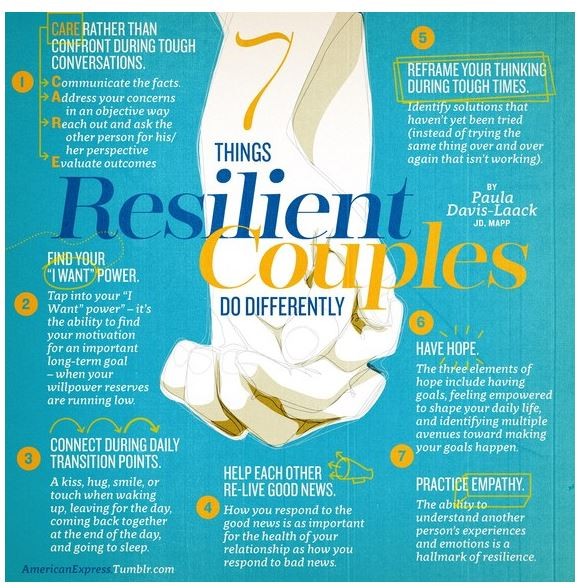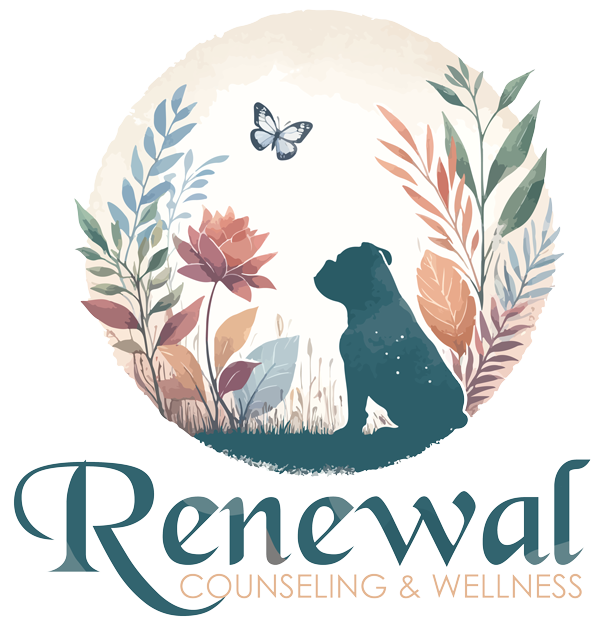My husband and I recently celebrated our 10-year anniversary, and it has caused me to reflect on the twelve years that we have known each other. As a teacher of resilience, defined as the ability to bounce back and grow and thrive during challenge, change and stress, I wanted to examine the traits that helped couples remain resilient. I looked at those relationships that worked, didn't work, and the research to compile these seven hallmarks of resilience in relationships:
1. CARE rather than confront during tough conversations.
Resilient couples know how to communicate assertively -- that is, in a clear, confident and controlled manner. While that's easier said than done, particularly with tough conversations, here's a model to help:
C -- Communicate the facts.
A -- Address your concerns in an objective way
R -- Reach out and ask the other person for his/her perspective
E -- Evaluate outcomes
Most importantly, do your homework before you even have the conversation. Ask yourself whether you have an accurate understanding of the problem. I'm always embarrassed when I have a conversation with someone only to realize I never really fully understood the issue. (1)
2. Find your "I want" power.
Relationships can take a little (and some days, a lot of) self-discipline. Stanford health psychologist, Dr. Kelly McGonigal, coined the phrase "I want" power, and it's an important component of self-control. (2) "I want" power is the ability to find your motivation when it really matters -- that important long-term goal that you want to focus your time and energy on. What are you working toward as a couple? Whatever it is, you need to be able to tap into this "I want" power when your willpower reserves are running low.
3. Connect during daily transition points.
I don't know about you, but my mornings tend to be busy getting ready for the day, and then when I get home from work, I'm exhausted and focused on starting dinner and other tasks. Resilient couples acknowledge each other at distinct transition points during the day: waking up, leaving for the day, coming back together at the end of the day and going to sleep. The acknowledgement can be as simple as a kiss, hug, smile or touch.
4. Help each other relive good news.
Human beings are hard-wired to notice and remember negative news and events. That's why you stand at the ready when your partner says, "Hey, I have a problem!" But what do you do when your partner says, "I've got great news?" How you respond to the good news is as important for the health of your relationship as how you respond to bad news according to psychologist, Dr. Shelly Gable. Killing the conversation by offering a short acknowledgement ("Hey, that's great") or hijacking the conversation by making it about you ("I'm training for that marathon, too!") are quick ways to weaken a relationship.
5. Reframe your thinking during tough times.
When a relationship hits a rough patch, it can be easy to think pessimistically. Thinking optimistically isn't about rainbows and unicorns, rather, it's about being realistic. Optimistic thinkers are able to identify solutions that haven't yet been tried (instead of trying the same thing over and over again that isn't working). In addition, optimistic thinkers zero in on what they can control, influence or leverage. One question I always ask myself during tough times is, "Will I still be dealing with this problem in the next month or year?" Odds are, the answer is no, and that gives me a little perspective.
6. Have hope.
When my ex-fiancé and I broke up years ago, three months before our wedding date, I was devastated. It was one of the times in my life where I felt truly lost and without hope. Whether you're dealing with a sick child, contemplating a divorce or break-up, or wondering how you're going to pay the bills, resilient couples have hope.
The three elements of hope include having goals (identifying pathways); feeling empowered to shape your daily life (remember to zero in on where you have control, influence and leverage); and identifying multiple avenues toward making your goals happen. Hope has been shown to be a strong predictor of satisfaction, even being called a symptom of happiness. (3)
7. Practice empathy.
The ability to understand another person's experiences and emotions is a powerful relationship tool. In addition to promoting forgiveness, empathy is also a hallmark of resilience. Empathetic people tend to be less selfish, having a genuine interest in the well-being of others. (4)
One of my favorite quotes is, "One of the hardest parts of life is deciding whether to walk away or try harder." There are many reasons to both stay in, and leave, a relationship. Choosing to stay requires resilience, and hopefully one of these seven strategies makes a difference in your relationship.
References:
(1) I developed the CARE acronym with my colleague, Lorrie Peniston. It is based on a model of assertive communication created by Sharon Anthony Bower and Gordon H. Bower and is more fully explained in their book, Asserting Yourself: A Practical Guide for Positive Change. New York: De Capo Press. See also Cameron, K. (2008). Positive Leadership: Strategies for Extraordinary Performance San Francisco, CA: Berrett-Koehler Publishers, Inc.
(2) McGonigal, K. (2012). The Willpower Instinct: How Self-Control Works, Why It Matters, and What You Can Do to Get More of It. New York, NY: The Penguin Group.
(3) Gallagher, M.W., & Lopez, S.J. (2009). Positive expectancies and mental health: Identifying the unique contributions of hope and optimism. Journal of Positive Psychology, 4, 548-56.
(4) Skodol, A.E. (2010). The resilient personality. In J.W. Reich, A.J. Zautra & J.S. Hall (Eds.), Handbook of Adult Resilience (pp. 112-125). New York: The Guilford Press.


